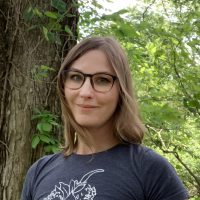By Chris Bavender
Southern Indiana Cooperative Invasives Management has hired a fifth regional specialist for Boone County and neighboring counties to help support the Indiana Invasives Initiative.

In her new role, Mary Hallinan will not only develop local Cooperative Invasive Species Management Areas, but she also will provide technical assistance to landowners, including invasive species property surveys and management plans. She also will provide support in optimizing messaging, outreach, publications and communications for the Indiana Invasive Initiative.
“The benefits of controlling invasive species are numerous, and this is especially the case for private lands. Invasive species don’t recognize boundaries, and only managing for them on public lands is not a sustainable long-term solution,” Hallinan said. “To effectively control or eradicate invasive species, this has to take place on a grassroots level on both the public and private sides of the fence. CISMAs help local partners cross these boundaries for the greater success of all.”
According to federal definition, an invasive species is “a non-native organism whose introduction causes or is likely to cause economic or environmental harm, or harm to human, animal, or plant health.”
Some of the more common/notable invasive species in Boone and Hamilton counties are Asian bush honeysuckle; autumn olive; callery pear; Canada thistle; common reed (found in urban retention ponds); garlic mustard; multiflora rose; tree-of-heaven; and winged burning bush.
“In terms of invasive management, the first step is to identify the invasive threat and then map and define the extent and severity. From there, creating invasive management goals, which might be eradication, or control to a threshold level to reduce impact,” Hallinan said. “Strong management plans also include a program for continued maintenance over time to prevent future infestations.”
Hallinan said she’s always had a passion for plants and a love of natural areas.
“I’ve spent nearly all my life in Indiana and care deeply about conserving natural areas, especially in terms of the wildlife diversity and important processes they support,” she said. “Through my facilitation and outreach work with SICIM, I am able to actively apply the capabilities I earned in my previous work and volunteer experiences toward the restoration and protection of the natural resources of Indiana.”


